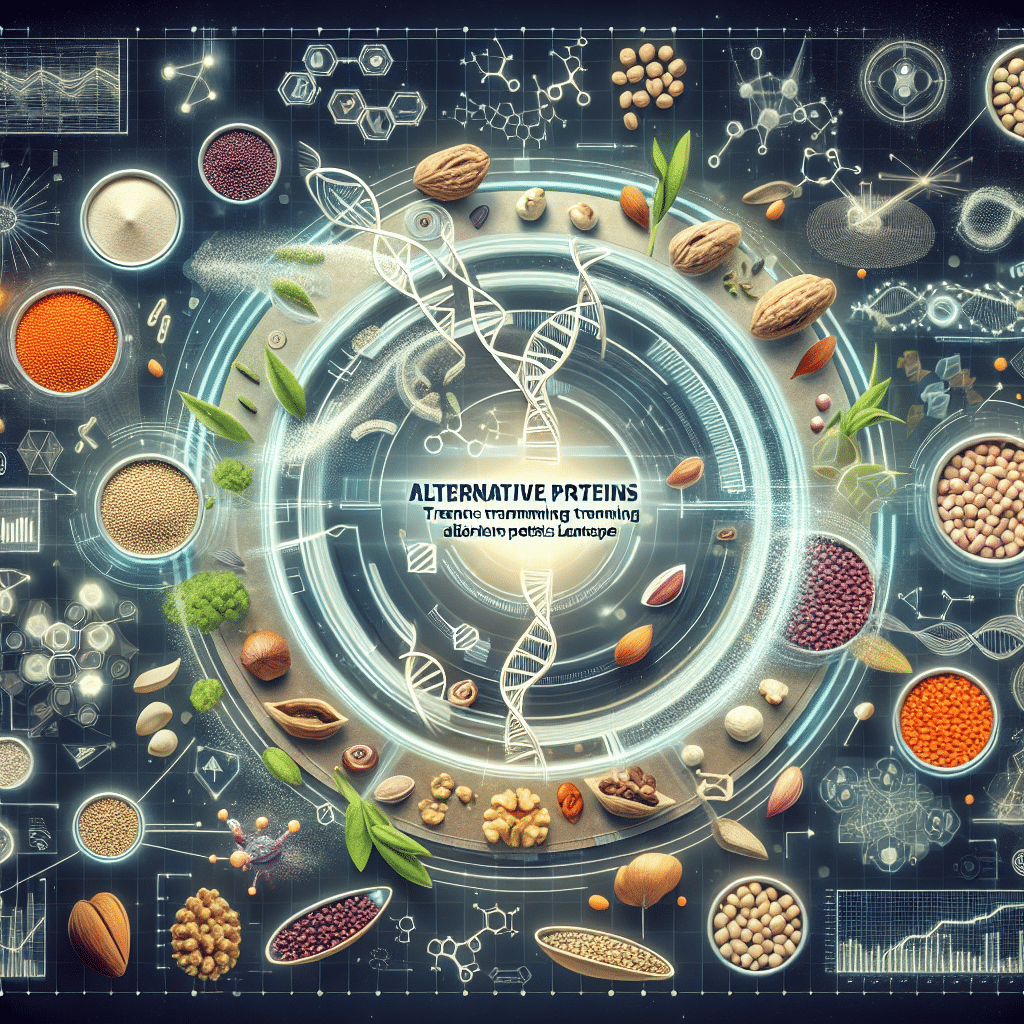Future Trends Transforming the Alternative Proteins Landscape
-
Table of Contents
- Alternative Proteins: Future Trends Shaping the Industry
- Technological Innovations in Protein Alternatives
- Consumer Demand Driving Market Growth
- Regulatory Landscape and Investment
- Integration into Mainstream Markets
- Global Market Trends and Projections
- Conclusion
- ETprotein: Your Source for High-Quality Alternative Proteins
Alternative Proteins: Future Trends Shaping the Industry

The alternative proteins landscape is undergoing a significant transformation, driven by technological advancements, consumer demand, and environmental concerns. As the global population continues to grow, the need for sustainable and efficient protein sources becomes more pressing. This article explores the future trends that are set to reshape the alternative proteins industry, offering valuable insights into what we can expect in the coming years.
Technological Innovations in Protein Alternatives
Technological breakthroughs are at the forefront of the alternative protein revolution. Innovations such as precision fermentation, cellular agriculture, and improvements in plant-based protein extraction are paving the way for more sustainable and scalable protein sources. These technologies are not only enhancing the nutritional profile of alternative proteins but also improving their taste, texture, and overall appeal to consumers.
- Precision Fermentation: This process involves using microorganisms to produce specific proteins and ingredients, offering a more sustainable and efficient production method compared to traditional animal farming.
- Cellular Agriculture: Cultured meat, grown from animal cells in a controlled environment, is gaining traction as a viable alternative to conventional meat, with the potential to drastically reduce the environmental impact of meat production.
- Plant-Based Protein Extraction: Advances in extraction techniques are leading to higher yields and purer forms of plant proteins, making them more competitive with animal-based proteins in terms of functionality and cost.
Consumer Demand Driving Market Growth
Consumer preferences are shifting towards more sustainable and ethical food choices, which is reflected in the growing demand for alternative proteins. Health concerns, environmental awareness, and animal welfare considerations are influencing purchasing decisions, leading to a surge in the alternative protein market.
- Health Consciousness: With an increasing focus on health and wellness, consumers are seeking out protein sources that offer nutritional benefits without the drawbacks associated with some animal proteins, such as high saturated fat and cholesterol levels.
- Environmental Impact: The carbon footprint of plant-based proteins is significantly lower than that of animal proteins, making them an attractive option for environmentally conscious consumers.
- Animal Welfare: Ethical concerns regarding animal farming practices are prompting consumers to explore cruelty-free protein alternatives.
Regulatory Landscape and Investment
Regulatory support and financial investment are crucial for the growth of the alternative proteins sector. Governments around the world are beginning to recognize the potential of alternative proteins to address food security and environmental challenges, leading to favorable policies and funding opportunities for startups and established companies alike.
- Government Policies: Subsidies, grants, and regulatory frameworks are being established to support research and development in the alternative proteins space.
- Investment Trends: Venture capital and private equity firms are increasingly investing in alternative protein companies, recognizing the sector’s potential for high returns and positive social impact.
Integration into Mainstream Markets
Alternative proteins are no longer niche products; they are becoming mainstream. Supermarkets, restaurants, and fast-food chains are expanding their offerings to include plant-based and lab-grown alternatives, making them more accessible to a broader audience.
- Retail Expansion: Plant-based meat and dairy alternatives are now widely available in grocery stores, often placed alongside traditional animal products to appeal to flexitarian consumers.
- Food Service Adoption: Major restaurant chains and food service providers are incorporating alternative proteins into their menus, catering to the growing demand for plant-based options.
Global Market Trends and Projections
The global alternative protein market is expected to continue its rapid growth. According to a report by MarketsandMarkets, the plant-based protein market alone is projected to reach USD 14.5 billion by 2025, growing at a CAGR of 7.1% from 2020. This growth is indicative of the broader trend across all alternative protein sources.
- Regional Growth: While North America and Europe currently lead the market, Asia-Pacific is expected to experience the highest growth rate due to increasing health awareness and dietary changes.
- Product Innovation: Companies are continuously innovating to improve the sensory experience and nutritional profile of alternative proteins, which will likely lead to an expanded consumer base.
Conclusion
The alternative proteins landscape is being transformed by a confluence of technological innovation, consumer demand, regulatory support, and market integration. These trends indicate a future where alternative proteins play a significant role in meeting global protein needs sustainably and ethically. As the industry continues to evolve, we can expect to see more sophisticated products that closely mimic the taste and texture of animal proteins, making the switch to alternative proteins easier for consumers around the world.
ETprotein: Your Source for High-Quality Alternative Proteins
If you’re looking to incorporate alternative proteins into your product offerings, ETprotein is a company worth considering. Their extensive range of organic bulk vegan proteins and L-(+)-Ergothioneine (EGT) products cater to various industries, including nutraceuticals, pharmaceuticals, cosmeceuticals, and food and beverage. With a commitment to non-GMO, allergen-free ingredients and high purity levels, ETprotein stands out as a reliable supplier for your protein needs.
About ETprotein:
ETprotein, a reputable protein and L-(+)-Ergothioneine (EGT) Chinese factory manufacturer and supplier, is renowned for producing, stocking, exporting, and delivering the highest quality organic bulk vegan proteins and L-(+)-Ergothioneine. They include Organic rice protein, clear rice protein, pea protein, clear pea protein, watermelon seed protein, pumpkin seed protein, sunflower seed protein, mung bean protein, peanut protein, and L-(+)-Ergothioneine EGT Pharmaceutical grade, L-(+)-Ergothioneine EGT food grade, L-(+)-Ergothioneine EGT cosmetic grade, L-(+)-Ergothioneine EGT reference grade and L-(+)-Ergothioneine EGT standard. Their offerings, characterized by a neutral taste, non-GMO, allergen-free attributes, with L-(+)-Ergothioneine purity over 98%, 99%, cater to a diverse range of industries. They serve nutraceutical, pharmaceutical, cosmeceutical, veterinary, as well as food and beverage finished product distributors, traders, and manufacturers across Europe, USA, Canada, Australia, Thailand, Japan, Korea, Brazil, and Chile, among others.
ETprotein specialization includes exporting and delivering tailor-made protein powder and finished nutritional supplements. Their extensive product range covers sectors like Food and Beverage, Sports Nutrition, Weight Management, Dietary Supplements, Health and Wellness Products, and Infant Formula, ensuring comprehensive solutions to meet all your protein needs.
As a trusted company by leading global food and beverage brands and Fortune 500 companies, ETprotein reinforces China’s reputation in the global arena. For more information or to sample their products, please contact them and email sales(at)ETprotein.com today.












